


@birminghamlawsociety 1 BULLETIN THE MAGAZINE OF THE BIRMINGHAM LAW SOCIETY DEC / JAN 2022-2023 PRESIDENT’S DINNER All the pictures and a rundown on this year’s event from page 6. FOUR BUSINESS HABITS to help conveyancing firms achieve success Page 18. www.birminghamlawsociety.co.uk info@birminghamlawsociety.co.uk @birminghamlawsociety @BhamLawSociety
REPORT Compliance Top Tenknow the facts! Page 20
REGULATION


LEAP offers cutting-edge, integrated legal technology expanding beyond traditional practice management software. Visit: leap.co.uk PracticeManagement L e gal Publishing DocumentAssembly & Management LegalAccounti n g The Legal Practice Productivity Solution






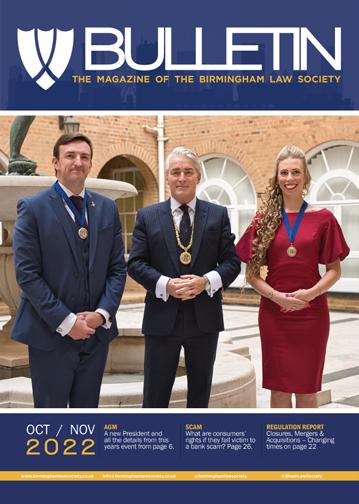
@birminghamlawsociety 3 CONTACT US www.birminghamlawsociety.co.uk info@birminghamlawsociety.co.uk Tel: 0121 227 8700 Birmingham Law Society, Suite 101, Cheltenham House 14-16 Temple Street, Birmingham, B2 5BG Twitter: @bhamlawsociety Insta: @birminghamlawinsta Editor: Jonathan Fraser. Editorial enquiries to jon@fu-media.co.uk ADVERTISE HERE To advertise your business to Birmingham Law Society members call Fraser Urquhart Media on 0116 2533445 or you can email jon@fu-media.co.uk or kevin@fu-media.co.uk EXPERT WITNESSES FOR: l Mechanical and Process Engineering l Manufacturing Industries l Oil and Gas Industries l Petrochemicals and Chemicals l Pharmaceuticals l Fertilizers and Pesticides l Metallurgical Industries l Safety and Environmental 2012-2018 THIS ISSUE CONTENTS 4. The Outgoing President’s Address. 6. Upcoming and Past Events. 8. The President’s Dinner. 10. 2023 Legal Awards. 12. Members’ News. 18. Four business habits to help conveyancing firms achieve success 20. Regulation Report: Compliance Top Ten. 24. Using technology to optimise communication in private client law practice. 30. Climate change reports: the new frontier of real estate due diligence. 30. Six things to consider when buying Legal software. Disclaimer: Copyright Fraser Urquhart Media. No part of this publication may be copied or reproduced, stored in a retrieval system or transmitted in any form or by any means - electronic, mechanical, photocopy, recording or otherwise without the prior permission of the publishers. Whilst every attempt has been made to ensure accuracy in compiling this publication, the Publisher cannot accept responsibility for any inaccuracies, omissions, breach of copyright or otherwise since compilation. The Publisher cannot be held responsible for any material submitted to the publication, not excluding advertisements. The views expressed within this title are not necessarily the views of the Publisher. Acceptance of advertisements does not imply recommendation by the Publisher. © Fraser Urquhart Media 2022. President’s Dinner
THE STORY SO FAR:
Season’s greetings to you all. I took office as your President on 28 September 2022 which, at the point of writing, is 6 weeks ago. In that time I have attended 15 evening events, ranging from the BLS Halloween Quiz night to 4 Law Society Dinners. Events have taken me to London, Liverpool, Bristol, and Warwickshire representing our Society and its members.
The running of the BLS Presidential year changed from its historical commencement in April to late September due to the covid interruption. It means that I have taken office at the start of the Law Society Dinner season. It follows that it’s not only the McDaid family turkey that will be stuffed by Christmas!

Happily, in between the standard presidential duties in far-flung places, I have been able to engage with our membership closer to home including attending the local universities and making early progress on some of the initiatives I have set for my presidential year. By good fortune, in my first week, I was able to participate as a panel speaker in the Online event “Why women leave the profession” hosted by the University of Birmingham. It explored the research paper presented by Professor Bob Lee and I hope those who joined online found it both informative and helpful. Looking for ways to ensure the retention of women in the legal profession is one of my key objectives for the year so it was great timing to have that conversation so early in my term of office.
The following week I attended the 21st-anniversary celebration of the University of Law and was able to witness the presentation of Awards to some outstanding
Alumni who have continued on their upward trajectory since leaving the University.
On 17 October BLS supported the “No Ordinary Lawyer” play at the Birmingham Rep telling the story of Britain’s first Black Judge with a sell-out audience of 300. We were able to host the event free for students thanks to No5 Barristers’ Chambers sponsoring the event.
EDI will continue to remain an important facet of all we do at BLS going forward; further evidenced by my participation in an EDI “In conversation with” at Aston University. Inez Brown, the first Black President of BLS, and Lubna Shuja, the first Asian Muslim woman to hold the office of President at TLS, and I were interviewed on stage about our respective roles, faith, and journey in the legal profession. The engagement with the mostly student audience of future lawyers was a thrill to participate in and the feedback and post-event engagement has been encouraging. My thanks go to Shaid Parveen, Associate Professor, and Senior Tutor at Aston University for inviting me to speak and for her hard work in making the event happen.
The start of November witnessed a collaboration with the West Midlands Irish Business Group and Birmingham City Council Planning Department. At a well-attended breakfast seminar, we heard from Simon DelahuntyForrest, Assistant Director of Development Planning & Development at Birmingham City Council, and property developer Anthony McCourt, Founder and CEO of Court Collaboration. Along with Councillor Ian Ward, they took us through some of the exciting plans for our city over the next 10 years plus. It is our intention to hold further events and I would encourage those who are lawyers in the construction and property sector to attend.
7 November marked the commencement of Pro Bono Week and Elena Goodfellow, Associate at Bevan Brittan and Chair of the Pro Bono Committee, joined me in welcoming in the week’s activities at a Breakfast Meeting for BLS members and pro bono leads. It was also an opportunity for us to further promote “The Climate Crisis is Real – How lawyers can get involved in tackling the climate crisis” event with speakers Lee McBride, Head of Lodders Environmental Law team, Emma Montlake, Head of Casework at Environmental Law Foundation, Fiona Nicholls, Head of Sustainability and Assurance at Gowlings, with Barrister Nina Pindham linked in from COP27 in Egypt.
One of the most important events we facilitated was the inaugural meeting of criminal law firms via DG Legal and Rock. In my inauguration speech, I spoke about the need for the Bar and the Law Society to collaborate when dealing with Government. The recent Bar strike highlighted the issue. We have not for the first time witnessed solicitors and barristers justifiably asking for more money after decades of under-investment. Sir Christopher Bellamy’s recommendation proposed 15% increase across the board. Solicitors were given 9% and the bar 15% with the latter having asked for 25%.
This is not and never has been about a blue or red Government. In 2002 we had a Labour Government; in 2022 we have a Conservative Government and still, those undertaking legally aided work remain undervalued and underpaid. Without investment and
4 www.birminghamlawsociety.co.uk
PRESIDENT’S LETTER
fair remuneration for lawyers, we will not be able to attract talented students to the profession and the system will simply fall apart. We are already witnessing legal deserts in parts of the country with firms moving away from legally aided work in order to survive. This is a massive blow for access to justice and needs to be reversed.

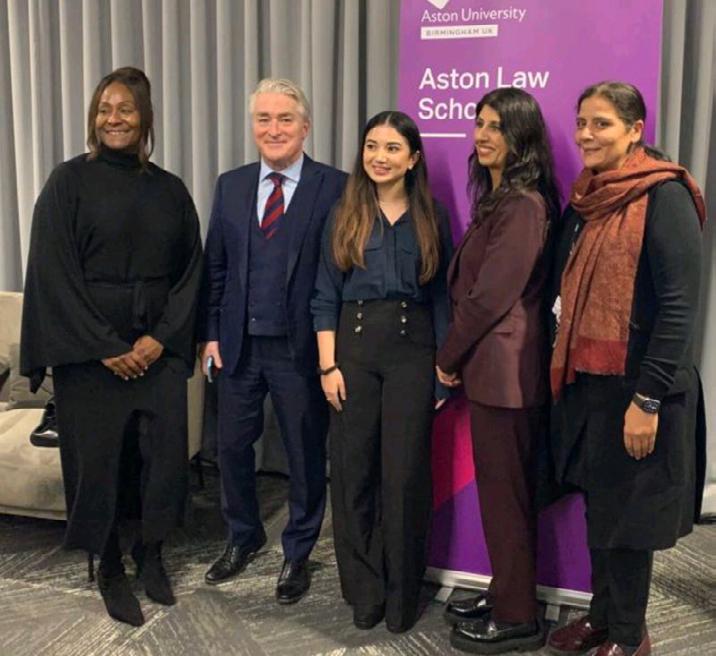

I hope the first meeting of the criminal law firms will result in better communication and positioning moving forward and will later lead to unity with the Bar who should and must, in my view, support solicitor firms seeking the parity they were assured they would receive. The strategy of divide rule and conquer has regrettably worked for the powers that be but not lawyers for the past four decades and it needs a major rethink from both arms of the profession.
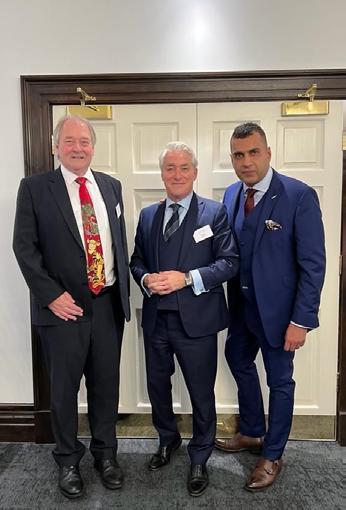
Finally, I draw your attention to the article “Compliance Top Ten Topics for 2023”. My thanks go to Jayne Willetts and Bronwen Still for producing it. I encourage you to read it. It is so important and really helpful in a practical way.
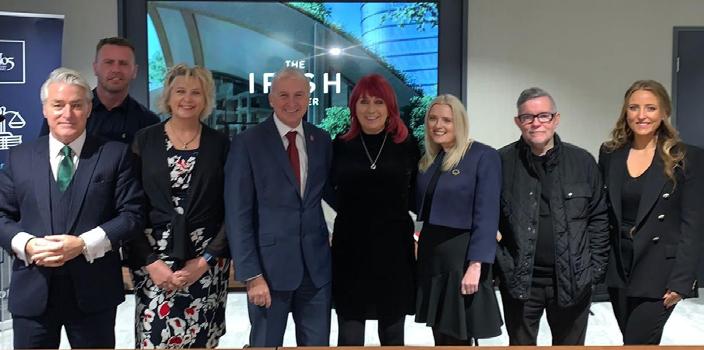



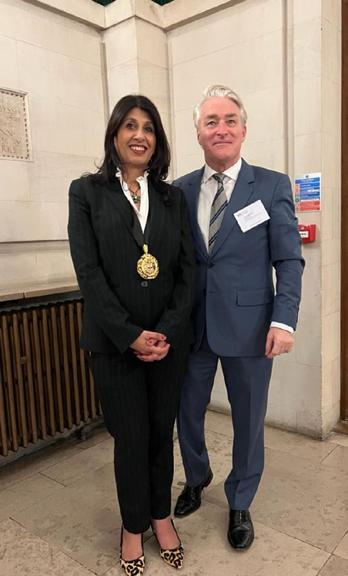
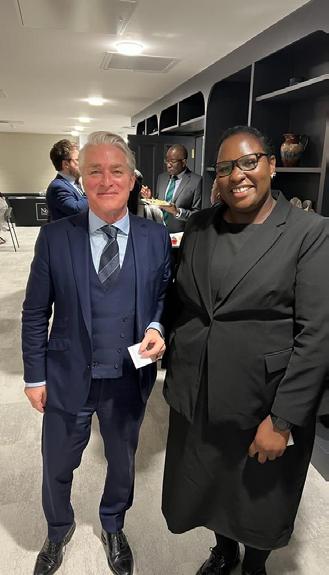
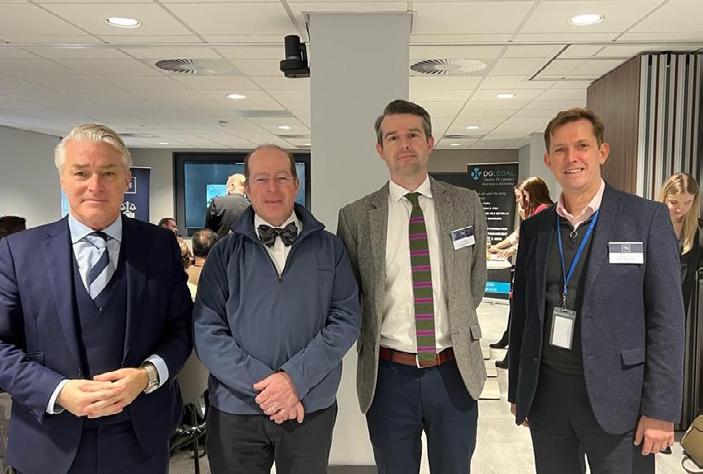
The SRA’s annual report on “Antimoney laundering compliance” reveals that only 22% of firms were fully compliant. It issued 29 fines totaling £287,000 as well as letters of advice, rebuke, and warnings. No further spoilers so do take time to digest and act on the tips Jayne and Bronwen have helpfully provided.


I wish you all a very happy and festive break over the Christmas holidays and look forward to engaging with you in any way you see fit throughout 2023.


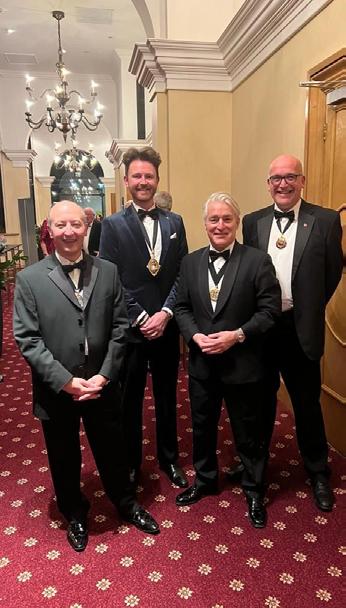 Tony McDaid President
Birmingham Law Society thanks our Gold Sponsors
Tony McDaid President
Birmingham Law Society thanks our Gold Sponsors
MEMBER’S EVENTS
BLS General Meeting
12th December, 4pm – 5.30pm, No5 Barristers’ Chambers
Free for members only
Networking Social for Lawyers






19th January, 6pm – 8pm, Cornwall Street Barristers Free for members
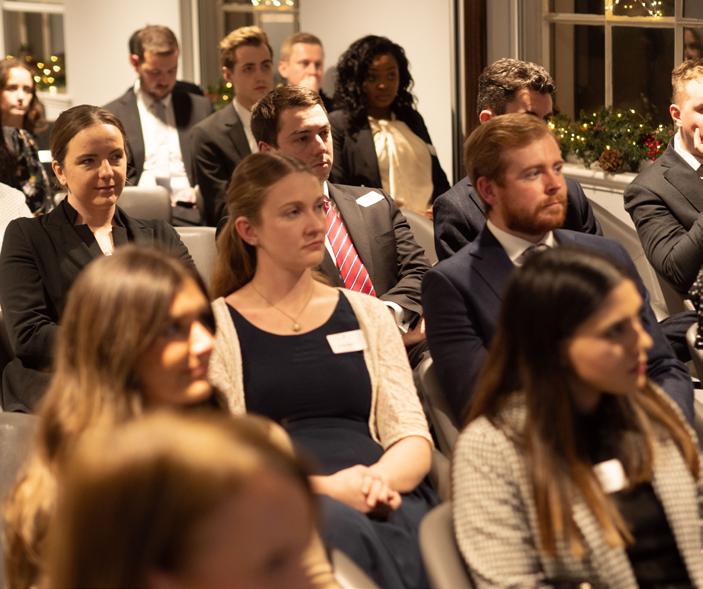

£10 +VAT for non-members
Raising Aspirations in Law


31st January, 5pm-7pm, BPP University Free for all to attend
Managing and Senior Partners Lunch
2nd February, 12.30pm – 2pm, Gateley
Free for Managing and Senior Partners only
Wine Tasting
16th February, 6pm – 8pm, Loki Wine
£25 +VAT for members
£35 +VAT for non-members
To reserve your place and find out more, make sure that you visit www.birminghamlawsociety.co.uk
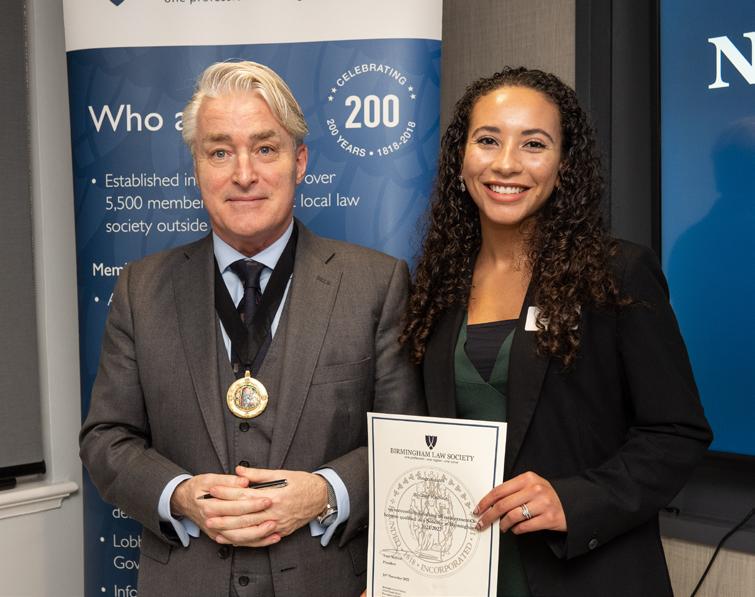

6 birminghamlawsociety.co.uk
EVENTS
LAWYER- STAGE PLAY NEWLY QUALIFIED EVENT
JUST AN ORDINARY
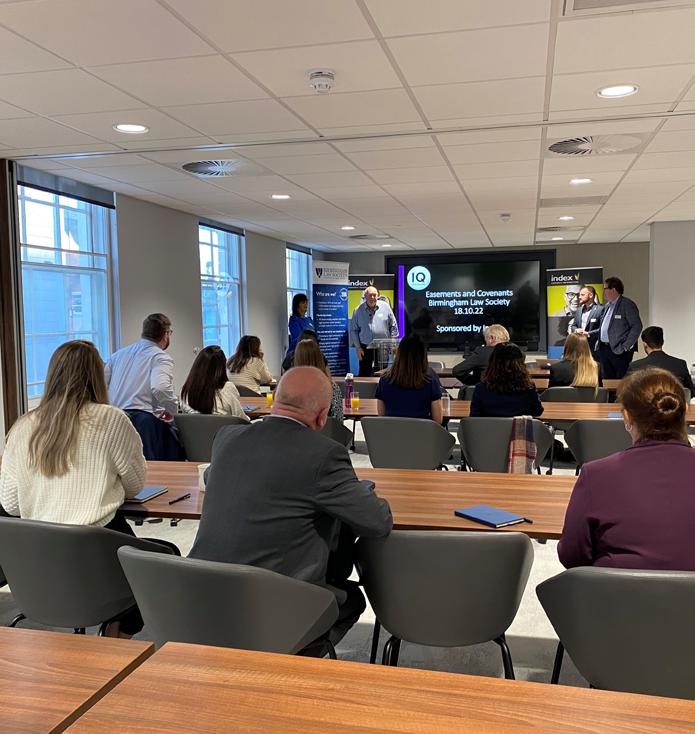

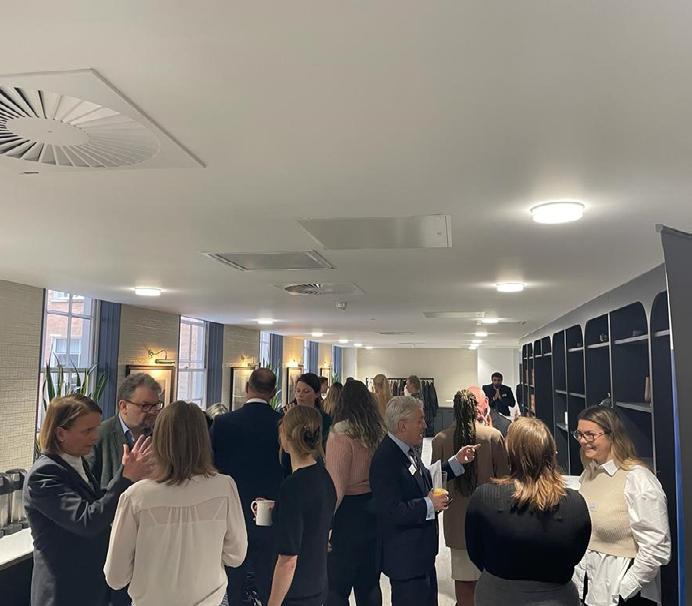
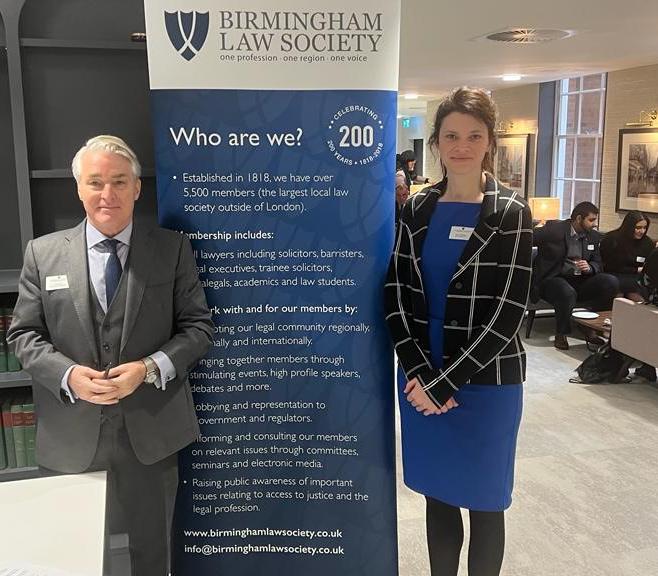
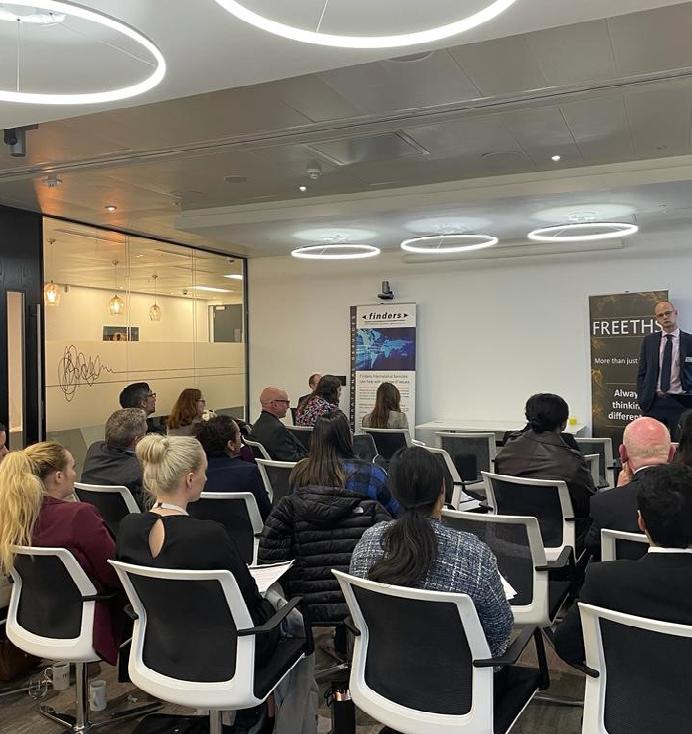

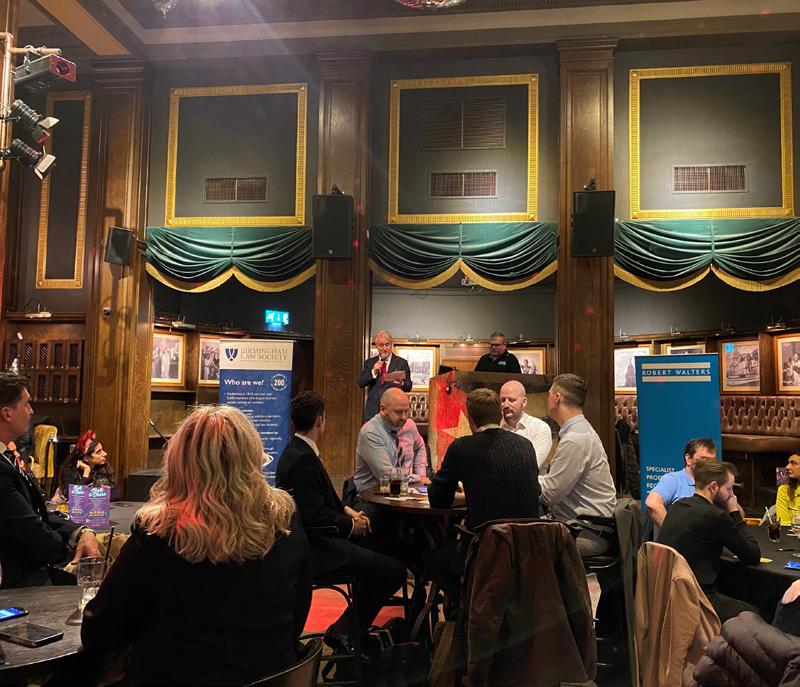
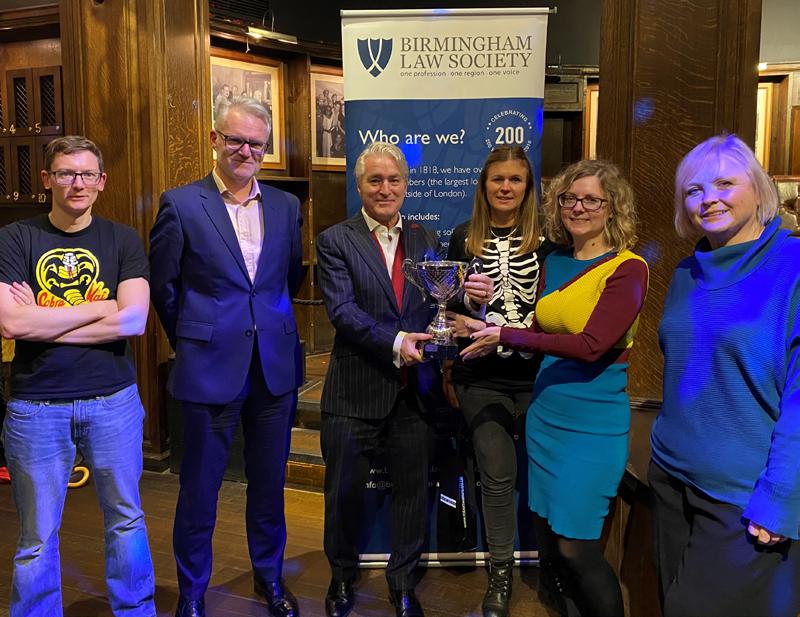
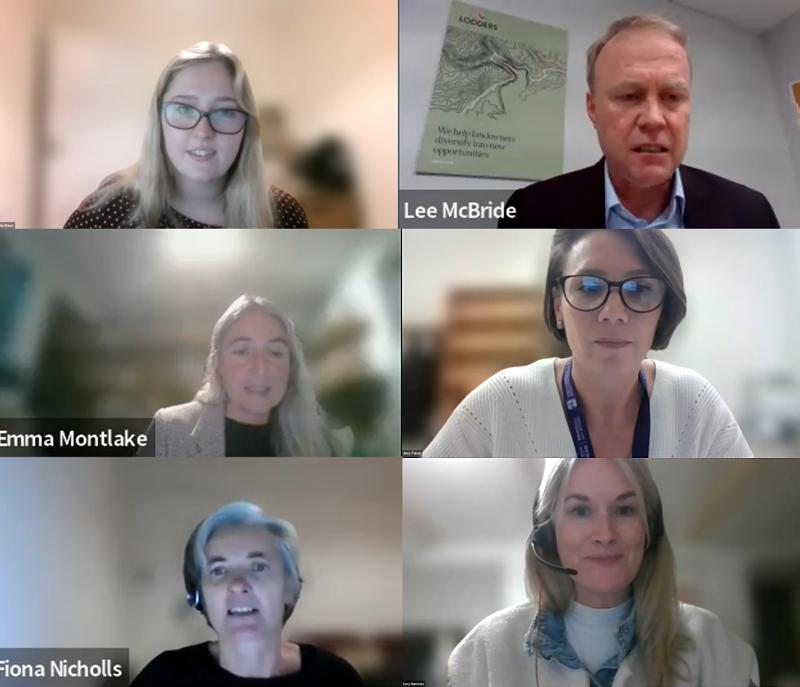


@birminghamlawsociety 7 EVENTS MEMBERSHIP BREAKFAST
DINNER CONTENTIOUS PROBATE BRIEFING DEMISTIFYING JUDICIAL APPLICATIONS PROPERTY CONFERENCE
BONO WEEK WELCOME
IN HOUSE LAWYER SOCIAL
BONO WEEK
- THE CLIMATE CRISIS
COUNCIL
PRO
LEGAL EAGLES HALLOWEEN QUIZ
PRO
EVENT
PRESIDENT’S DINNER
Breaking from tradition, the President’s Dinner was jointly hosted by newly appointed President, Tony McDaid, alongside immediate Past President, Stephanie Perraton. Taking place on 17th November at Birmingham Botanical Gardens, 200 guests including guest speaker, Lord Digby Jones who flew in especially from Guernsey to support Stephanie, came together to celebrate the legal community.

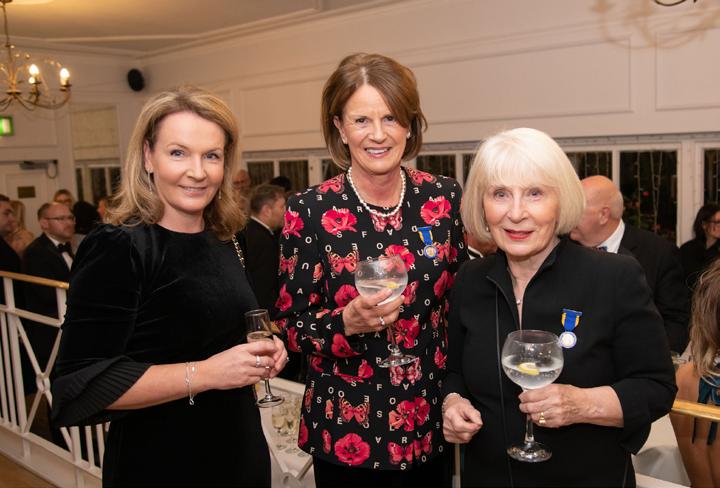


A special thank you to this year’s sponsors; Landmark Information, Midlands Air Ambulance Charity, Oosha – an access company and St Philips Barristers.

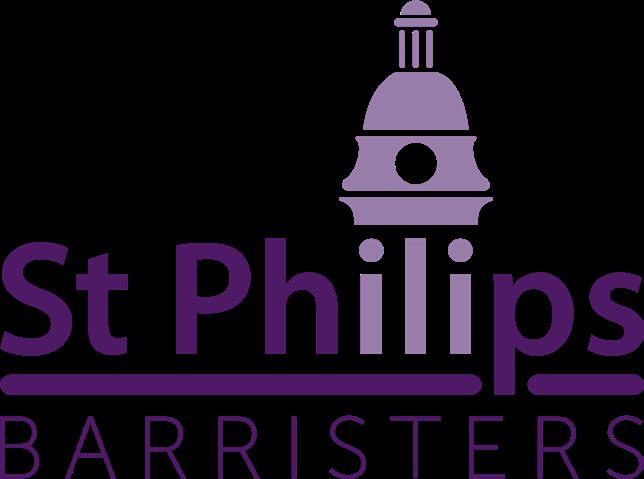






As the event was a joint effort from both Tony and Stephanie, there were four charities we were raising much needed funds for. A last chance to support Stephanie’s two charities, SIFA Fireside and Walk the Walk whilst Tony’s current charities are the Child Brain Injury Trust (CBIT) and Midlands Air Ambulance Charity (MAAC). There was a 0.5 carat diamond up for grabs in the charity raffle as well as a variety of silent auction prizes which helped us raise £1683.17.
Sponsored by:
8 birminghamlawsociety.co.uk EVENTS







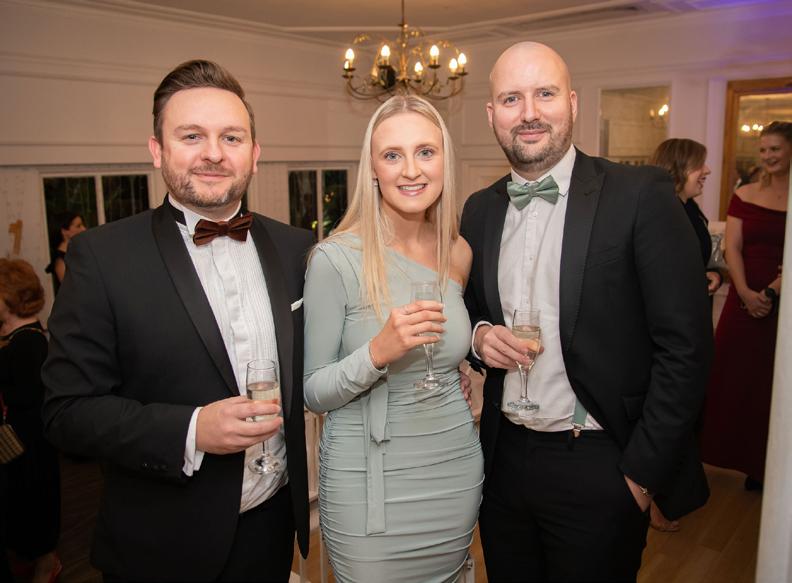
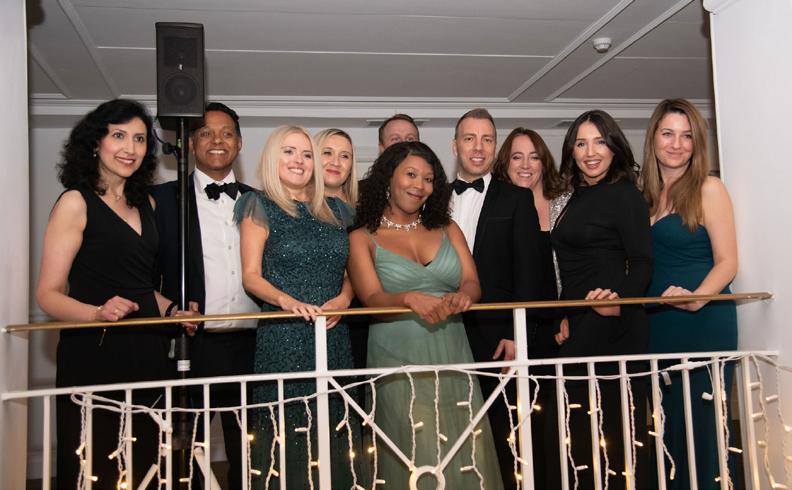

@birminghamlawsociety 9 EVENTS
Tickets for the Birmingham Law Society Legal Awards 2023 are on sale now.

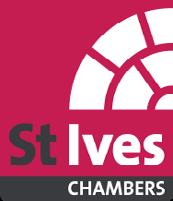

The Awards, now in their 21st consecutive year, will shine the spotlight on the firms, teams and individuals who have excelled over the past 12 months.

Guests will enjoy a pre-dinner drinks reception from 6:45pm, followed by a four-course meal called at 7:30pm.
Spaces for the annual sell-out event are limited so it is advisable to book early to avoid disappointment.


for details on how to book your tickets. Booking Form >
2023 Legal
2023 Legal
Please see overleaf
BOOK NOW!
Awards
Awards
Don’t miss out on your chance to attend the biggest and best event in the West Midlands legal calendar.
The quickest and easiest way to to reserve your ticket(s) or table(s) is to complete this booking form and send to: awards@birminghamlawsociety.co.uk Alternatively, you can return this form to: Birmingham Law Society Suite 101, Cheltenham House, 14-16 Temple Street, Birmingham B2 5BG DX: 13100, Birmingham 1 Company Name: Company Address: Contact Name: Telephone No: Fax No: E-mail: I would like to book a table for 10 persons @ £1,200 + VAT Yes No (Member Rate) I would like to book a table for 10 persons @ £1,500 + VAT Yes No (Non-member Rate) or I would like to book tickets @ £120 + VAT Total amount: (Member Rate) I would like to book tickets @ £150 + VAT Total amount: (Non-member Rate) 9TH MARCH 2023, 6.45PM INTERNATIONAL CONVENTION CENTRE, BIRMINGHAM Members - £120 + VAT Non-Members - £150 + VAT ... a night not to be missed (DX number to be given where available) (please circle) (please circle) 2023 Legal Awards BOOK NOW! 2023 Legal Awards
An historic car event taking place this weekend offers a fascinating insight into developments in technology in the burgeoning UK car industry at the turn of the 20th century.

The annual London to Brighton Veteran Car Run will be held on Sunday 6 November and among the participants attempting the 60-mile route is Forresters managing partner, Matt Shaw. Matt will be piloting a 1904 Wolseley courtesy of the British Motor Museum, which houses the world’s largest collection of historic British cars, with Heart West Midlands radio presenter Ed James.
To be eligible for the run, vehicles must have been manufactured before 1905 – a time when car manufacturers were competing to patent their technologies to establish a foothold in the growing car market.
The Wolseley Tool & Motor Company, manufacturer of the 6hp open-top two-seater driven by Matt and Ed, was not alone in seeking protection for various innovations in car design and engineering, including steering and brake mechanisms, improvements to spark plug designs and gear differentials. As well as protecting these inventions in its home UK market, Wolesley sought protection in the United States which was a pioneer of mass-market car production.
At least two US patents appear to relate to the vehicle Matt will be driving. The inventor named in both patents is Herbert Austin, who later founded the Austin Motor Company, but at the time was managing director of Wolseley Tool & Motor Company.
One patent, US 721,413, filed in 1902 was for a “transversely mounted horizontal engine design”. However, according to the Wolesley Register this particular engine layout was short lived, as from 1906 the company switched to using vertical engine cars. The second patent, US 769,582, also filed in 1902, was for a “water cooling system for explosion motors”, although the distinctive ‘bee-hive’ style of radiator was apparently present in earlier Wolesley models.
Matt Shaw said: “As a patent attorney it was hard to resist looking at patents related to this historical vehicle. They serve as a window to such an exciting period in the history of the motor car. To find a link between the various patented technologies, this Wolesley and the man who went on to make such a major contribution to the West Midlands and wider UK car industry was totally unexpected.”
For more information on the London to Brighton Veteran Run and the vehicles taking part, please see the event website.
NEW RECRUIT FOR BRUM RESIDENTIAL TEAM
After a string of successful client wins, full-service law firm Shakespeare Martineau has expanded its residential development offering in the West Midlands with the appointment of solicitor Jack Kelly.
With more than eight years’ postqualified experience, Jack has joined the firm as a legal director from Gowling WLG.
In his new role, he will be acting for developers, landowners and promoters on all aspects of residential development, with a particular focus on open market acquisitions and disposals, promotion of land, and developer-side affordable housing deals.
Jack, who is based in Birmingham but working with clients and teams nationally, said: “I am delighted to have joined Shakespeare Martineau and was particularly attracted to the firm’s authentic and collaborative culture and beliefs, which strongly align with mine.

“I take great pleasure in seeing prospective development sites – which typically begin the development cycle as bare land – come to fruition as places in which people reside, build communities and, ultimately, spend their lives.
“There still appears to be a stigma in respect of new-build developments to some degree, but developers are becoming increasingly conscious of the need to design visually-appealing schemes that will leave a positive legacy in their local area.
“In particular, I am looking forward to using my expertise to help the residential development team deliver on client growth and assist the junior lawyers to achieve their ambitions at the firm. I also aim to build long-term relationships with clients by understanding who they are and what they want to accomplish, while providing clear, concise and pragmatic advice.”
NEWS
HEAD
12 birminghamlawsociety.co.uk
FORESTERS
OFF ON A VINTAGE ADVENTURE
INVESTMENT IN NEW OFFICE FOR SYDNEY MITCHELL
working environment for our teams to develop and grow further.”
“Our teams have embraced the new working practices and we hope that these new facilities will further enhance the ability of our teams to work both remotely but also to enjoy physically coming into the office to meet with team members and clients alike. The new offices are also paperless helping to reduce our carbon footprint.”
“We are proud of our people and of the services we provide to our clients. Our firm is something of an anomaly within the West Midlands whilst it remains a medium size general practice firm it competes with much larger regional and national law firms in terms of the legal expertise it provides and the level of service that it delivers to its clients.”
invested in comfortable meeting rooms for clients with the most up to date technology.
The firm has significantly invested in their new office facilities at Cavendish House in Birmingham, focusing on the working environment for staff embracing new working practices such as flexible and hybrid working, and operating a paperless office. The firm has also
DWF IS NAMED AS A
Karen Moores, Senior Partner, commented: “Despite the pandemic the firm has managed to increase its turnover and invest in its people, with new people joining our growing firm. The investment in our new premises in Birmingham shows our commitment to the city and provides an excellent

WORKING
Sydney Mitchell LLP’s specialist teams include for business clients, commercial property, company and commercial services (to include employment), commercial litigation and restructuring and insolvency. Private client teams include family law, residential property, dispute resolution, immigration, wills and probate, tax and trusts, personal injury and employment.
FAMILIES TOP TEN EMPLOYER 2022
guardians with a series of new and improved family friendly policies, in response to colleague feedback. Significant uplifts were made to maternity, paternity, adoption and shared parental leave and discounted nursery fees were introduced.
New policy provisions to support colleagues who have premature babies, are doing IVF or who experience the loss of a child were also introduced. While support has always been available, the policies provide a consistent level of support to all UK colleagues.
Seema Bains, DWF partner and Head of the Diversity and Inclusion Global Leadership Group said: “Inclusion in this competitive list is a fantastic acknowledgement of the efforts being undertaken throughout DWF to help our colleagues thrive regardless of their circumstances.

DWF, the global provider of integrated legal and business services, has been named in the top ten most family-friendly employers in the UK, by the national charity for working parents and carers, Working Families.
Now in its thirteenth year, employers large and small from across the public, private, and third sectors compete annually to gain a coveted place on the charity’s list of Top Employers for Working Families.
Employers were assessed using Working Families’ Benchmark and were scored on four key areas to build a comprehensive picture of their flexible and family-friendly policies and practices that specifically support mothers, fathers, and carers.
DWF has introduced a number of initiatives aimed at supporting working families this year. In June, the business announced enhanced support for working parents and
“Our Purpose – to deliver positive outcomes with our colleagues, clients and communities – is core to our culture at DWF. Supporting working families is central to that Purpose and our values. We strive to ‘Be better together’ by encouraging, enabling and empowering all of our colleagues.
“Whilst DWF has embraced agile working for a number of years, post pandemic we are focusing on how we can support colleagues and managers to navigate flexible working options that are right for them.
“We have also delivered an expansion of our family friendly policies, creation of a careers hub, development of our menopause support group and increased promotion of workplace adjustments to provide colleagues with the flexibility to address their personal needs and perform at their best.”
NEWS
@birminghamlawsociety 13
Sydney Mitchell LLP, Top Tier Legal 500 Law Firm recently celebrated the opening of their new offices in Birmingham city centre.
VWV CELEBRATES THREE PARTNER PROMOTIONS
change within the firm’s leading education practice. Kenji has been recommended in the independent legal directories as providing “knowledgeable and proactive advice to clients”.
Jaime, who joined the firm in 2013 as a solicitor when VWV launched a Birmingham office, will be leading the firm’s Academies and Maintained Schools team for the Midlands, primarily advising maintained schools, academies and multi-academy trusts on the wide range of governance, regulatory and other matters that they face. Jaime will also continue to advise charities both local and national alongside fellow charities partner, Shivaji Shiva.
Award-winning national law firm VWV continues to strengthen its partnership, with three lawyers being promoted to Partner bringing the firm’s total number to 93.
The Partners span three teams - Kenji Batchelor in Corporate, Jaime Hobday in Charities and Sarah Martin in VWV’s subsidiary brand Narrow Quay HR.

VWV Managing Partner Simon Heald commented: “Congratulations to Kenji,
Jaime and Sarah on their well-deserved promotions. They have all significantly contributed to VWV’s success and growth. I am thrilled to welcome them to the growing partnership at VWV.”
Kenji joined the firm in 2019 with a broad practice advising charities on a wide range of governance and commercial matters. Since joining VWV, Kenji has developed an expertise in working with independent schools on strategic projects and structural
Sarah, who joined the firm in 2012, cofounded and is a Director of Narrow Quay HR, VWV’s HR consultancy. Prior to becoming a HR specialist, Sarah spent many years as an employment lawyer. Sarah uses the skills she developed as a lawyer to ensure she can support clients across a range of sectors. Recently Sarah has led on a collaboration with Albion Legal to offer legal protection insurance to clients seeking to manage the risks of employment claims.
In addition to the Partner promotions, 10 more of the firm’s legal staff have achieved promotions to Associate or Senior Associate.
FIRM ENHANCES SUPPORT TO CHARITIES WITH NEW LEGACY ADMINISTRATION SERVICE
As part of the launch, the firm, which has office hubs in Birmingham, Solihull and Stratford-upon-Avon, has welcomed specialist solicitor Gaynor Lanceley to head-up the service –bringing with her almost 20 years’ experience in legacy administration.

Shakespeare Martineau has expanded the support it provides to charities with its newly-launched legacy administration service – helping organisations maximise the gifts they receive in wills.
Alongside interim or permanent legacy administration services, the offering provides charities across England and Wales with strategic legacy project work, legacy forecasting and budgeting, procedure reviews, and team training.
A highly experienced solicitor who has both the STEP and Solicitors for the Elderly accreditations, Gaynor has joined Shakespeare Martineau from Catherine Higgins Law. Prior to this, she worked at Jackson Lees Group and Morecrofts Solicitors. Over the years, she has supported multiple charities, including the Yorkshire and North West air ambulance charities, and was previously a trustee for the Woodlands Hospice.
Gaynor, who will be primarily based at home in Liverpool but working with clients and teams nationally, said: “There are very few law firms in the UK that offer a legacy administration service, particularly in the midlands and the north, so this launch is a fabulous experience, venture and opportunity for us.
“I am passionate about working with charities to help them to recognise the importance of legacy income, which is growing year on year. Gifts to charity are very personal and mean so much to the donor who kindly included them in their will – the importance of even the smallest such gift should never be underestimated.
“As a solicitor, I can explain the terms set out in wills and trusts and decode legal jargon. I can answer complex tax and accounts issues, and provide updates regarding the legal administrative process. For me, this is the best job in the world and it is a privilege to be able to work with charities to maximise the gifts they receive in wills and ensure their supporters’ wishes are carried out.
“I am looking forward to supporting charities – making sure they get the gift that is intended for them in its entirety.”
Research by charity legacy consortium Legacy Foresight shows the total UK legacy income grew from £800m in 1990 to £3bn in 2020.
14 NEWS



Ci Self-issue Insurance from Legal & Contingency provides an immediate solution to your conveyancing needs, offering wide-ranging Residential and Commercial cover at highly competitive premiums. Our facility gives you easy access to: • Instant issue Single and Multi-Policy cover • Backdating and shared access functionality • Online indemnity top-ups • A full quote and purchase history • A choice of payment methods … all at the touch of a button. Our team is on hand to assist you, backed up by our Fast Track bespoke service for risks that may fall outside of the self-issue criteria. Today’s conveyancing demands instant results. Conveyancing Insurance (Ci) Self-issue is a portfolio of insurance products provided by Legal & Contingency Limited. Legal & Contingency Limited is authorised and regulated by the Financial Conduct Authority, Reference No.312376. Registered in England No.3511606. Explore our online portal here: 020 7397 4363 enquiries@conveyancinginsurance.co.uk www.conveyancinginsurance.co.uk
ALMOST TIME TO GET FESTIVE – BUT IS YOUR CLIENT CARE AT RISK?
Protect your brand
Outsourced services play an important role in not only handling queries and capturing leads but protecting the brands that organisations work so hard to develop. When Christmas leaves you light on resource, outsourced help allows in-house staff to continue giving warm face-to-face client service while simultaneously avoiding calls ringing out or reaching voicemail. If a client calls with a concern and is unable to speak to the correct person, leaving a message with a friendly, knowledgeable telephone answering agent will leave them feeling confident that their business is valued and protect brand reputation.
Avoid seasonal changes in revenue
It’s been a rollercoaster of a year – political turmoil, the cost-of-living crisis, unprecedented recruitment challenges, the list goes on. Employees across the legal industry are understandably feeling stressed and overwhelmed.
Your workforce doesn’t just deserve a break, they need one and with the festive season upon us, many will take the opportunity for some well-deserved R&R. The good news is that well rested employees are more focused and productive but is there a risk that time off could have a shortterm impact on your client experience. And could that have a long-term impact on your reputation?
Here, Bernadette Bennett, head of legal sector at leading outsourced communications provider, Moneypenny, explains why investing in year-round support is the answer to delivering consistently brilliant client care that doesn’t depend on seasonality or staffing levels.

Avoid last minute panic
In the stress of year-end, resource considerations often fall to the bottom of the priority list, leaving client service shaped gaps in many legal businesses. Outsourced client care solutions, such as telephone answering support or live chat, solves this issue and can be scaled up or down depending on requirements – ensuring you’re prepared for any eventuality and saving on holiday-induced panic.
Quiet periods can be a standard part of your business but if your bottom line is dipping because you’re unable to handle incoming enquiries, there’s a problem. In a competitive marketplace, if a prospect can’t speak to someone online or via phone, they’ll fall straight into the hands of a competitor Ensure you have an adequate client communications solution in place and grab the business by both hands. Even better, prove yourself to be a client service champion at a time when others so regularly get it wrong.
You’ll not only benefit from improved client care, a stronger pipeline and a rock-solid reputation, but a happier, more engaged workforce. Merry Christmas!
Moneypenny handles more than 2 million legal calls and live chats each year for more than 1,000 legal firms in the UK, including 60 of the Top 200, thanks to its dedicated team of legal PAs.
Established in 2000, Moneypenny is the world’s market leader for telephone answering, live chat, outsourced switchboard, and customer contact solutions. In total, more than 13,000 businesses across the UK benefit from Moneypenny’s mix of extraordinary people and ground-breaking technology.
For more information about Moneypenny’s work with the legal sector, visit www.moneypenny.com
BLS’S RICHARD PORT ON BEING MADE A MEMBER OF THE BRITISH EMPIRE
being late due to the M25 protesters resulting in us all having to be transported by golf buggy from one end of the castle to the other. The press were very confused and thought they had missed out on a photo opportunity.
It was great to speak to Prince William about the work I have being doing to help victims of domestic abuse over the many years as well as the frequent struggles I’ve faced in ensuring the Justice system and other law firms, are fit for purpose.
In November I had the great honour of being made a Member of the British Empire by His Royal Highness Prince William at Windsor Castle.

It was a day I will never forget, especially with one of my guests
I also got to speak about the amazing work that George Green LLP has been doing to help the community and its clients. We truly are a paradigm of excellence in the West Midlands legal sector, and I am so very proud to be working with individuals that actually help and care for their clients and community.
As well as the Birmingham Law Society’s tireless efforts to help all its members to make the legal sector so much better and the amazing work that Heart of England Community Foundation does to give back and make a change for those in need.
As much as I am proud to receive such an honour this isn’t the end of the road for me. My ladder hasn’t been climbed yet and I will continue to push for change for victims, the community, and the legal sector.
For all younger lawyers or other professionals at the start of their career, all I can say to you is, do what you are passionate about and don’t let anyone dissuade or side track you from your cause.
NEWS
16 birminghamlawsociety.co.uk
IT’S
£182M ACQUISITION ADVISED BY IRWIN MITCHELL
This deal marks a significant milestone for the Motus group internationally, as it continues to expand its automotive aftermarket capability in the UK and reduce the Group’s dependency on vehicle sales.
Irwin Mitchell’s Corporate team advised Motus with partner Emma Callow leading the team. She was supported by Senior Associate Matt Smith; Greg Mazgajczyk; Tom Wisniewski, Alex Bloomer and Paige Richardson. Gurpreet Hayer led the Irwin Mitchell Real Estate team, supported by Stuart McDonald and Mary Gharmount.
Irwin Mitchell previously advised Motus Aftermarket Parts on the acquisition of FAI Automotive in October last year.
NEW TRAINEES JOIN CITY FIRM
Forresters has recruited two trainees for its Birmingham office, as part of the firm’s commitment to developing talent and expertise for the future.

The Birmingham office
have advised Motus Holdings (UK) Limited on its £182m acquisition of UK-based automotive components supplier, Motor Parts Direct (Holdings) Limited.
Motor Parts Direct was established in 1999 in Kettering and now has a network of 175 branches and a fleet of over 900 delivery vehicles. The business has more than 14,000 active customers and employs 1,700 people.
Motus Holdings (UK) Limited is the UKbased subsidiary of South African listed Motus Holdings Limited. The company was listed on the Johannesburg Stock Exchange in November 2018 and is now South Africa’s leading automotive group, employing over 17,000 people globally.
Commenting on the latest deal, Emma Callow said: “The Irwin Mitchell team is delighted to have been able to support Motus on this deal as it continues to grow its footprint in this sector in the UK. It required real team work and collaboration on all sides to be able to deliver this historic transaction for Motus and we look forward to working with the Motus team in future.”

Commenting on the acquisition, Motus CEO, Osman Arbee, said: “Motus remains focused on deepening its competitiveness and relevance across the full automotive value chain. The acquired business is cash generative and asset light. It will provide economies of scale, procurement benefits and synergies. Key management have been secured and are committed to continue managing the business.”
In the Birmingham office, Jacob Tyszka and Benjamin Page have joined the technology and engineering team. Jacob graduated from Imperial College London back in 2015, having read materials science & engineering. Prior to joining Forresters, Jacob spent five years working at British Steel, and he says that Forresters’ “Clear Direction” ethos particularly resonates with him. “In my time in industry, I found that distilling complex information into key ideas and straightforward solutions greatly helped the odds of a successful project, something that I will carry over to my work with clients and colleagues at Forresters.”
Benjamin joins Forresters as a trainee patent attorney straight after completing a Master of Physics (with Honours) degree at the University of Warwick. He said: “A career in intellectual property, and specifically as a patent attorney, appealed to me because it allows me to apply my scientific understanding to a huge range of different technologies, factoring in both legal and commercial considerations.

NEWS
of Irwin Mitchell’s Corporate and Real Estate teams
@birminghamlawsociety 17
FOUR BUSINESS HABITS TO HELP CONVEYANCING FIRMS ACHIEVE SUCCESS
operation, your firm’s fundamental processes need to be reviewed so habits don’t become stale and inefficient. When a task becomes a habit, it can easily be overlooked and possibly ineffective, since technology, clients, and goals change. Having a continuous improvement mindset will ensure your firm is constantly seeking the best outcome.
A recent survey by the Legal Services Consumer Panel has revealed that satisfaction levels among users of conveyancing services fell by 5% on the previous year to 88% in 2022. The research also found that the number of consumers shopping around for conveyancing services has this year risen to 48% (2021: 38%) - the biggest growth area compared to other legal services.
Chris Pucci, CEO of Osprey Approach, says that with more consumers willing to invest time in finding the right conveyancer, but fewer reporting a satisfactory outcome, it’s important that conveyancing firms “think carefully about how to attract and retain clients. It’ll be the quality of a firm’s client service that’ll set them apart from competitors – and ensure they receive five-star reviews and recommendations - not just the legal advice or price.”
Scott Bozinis, CEO of InfoTrack, agrees, and says that many conveyancing practices aren’t fully benefitting from technology’s potential to improve the client experience. “The software exists to help firms move faster, monitor, and meet deadlines, improve reporting, supervise teams more effectively, and directly improve the client’s onboarding experience. Embracing these solutions benefits law firms and their clients and can create a competitive advantage.”
FOUR EFFECTIVE BUSINESS HABITS FOR CONVEYANCING FIRMS
1. Think ‘digital-first’
All good habits stem from a successful digital-first strategy, which sets solid business foundations. Thinking digital-first is about adopting a concept known as Anywhere Operations,
which ensures your business can operate, collaborate, and service clients without the reliance on physical locations, infrastructure, or processes, providing the ultimate flexibility and continuity.
Bozinis points to InfoTrack’s ability to integrate with leading case management providers, which “removes admin-heavy conveyancing tasks, that can be automated within the case management system but without the need to re-key data. Firms can also complete digital services like creating a property report and submitting digital IDs; everything is contained in one system which reduces errors and improves efficiencies.”
2. BE CLIENT-FOCUSED
The success of any modern conveyancing firm relies heavily on the quality of your client service. A key benchmark of the value provided to clients is how timely, convenient, and personal the service is.
Digitally onboarding new clients helps to ensure that you deliver an exceptional client service easily and effectively from the initial client enquiry, through to the signing of contracts.
Implementing a range of digital client-focused habits such as electronic signatures for documents, digital ID verification, and a secure client portal that provides real time updates, will reduce friction in your clients’ experiences and help you win, and retain, new business, as well as compete with larger firms, who 54% of SMEs believe are their biggest threat.
3. CONTINUOUS IMPROVEMENT
To run a continually effective
To facilitate a continuous improvement mindset, you first need to document existing processes and habits, which will enable you to identify current challenges and areas for improvements, whilst highlighting how tech can enhance each process. For instance, has your firm prepared for the mandatory switch to digital AP1s, which is a matter of weeks away?
4. EMPOWER EMPLOYEES
76% of SME firms believe recruitment challenges pose the biggest impact to their business strategy and that’s certainly true for the conveyancing sector. As one of the biggest investments you’ll make for your business, look to empower your team with the right digital tools and freedom to grow to be a successful modern law firm that will attract the best talent.
Some of the habits you’ll need to achieve success in this area include implementing regular one-to-one time with the team to provide a safe space for feedback and discussion, scheduling time for training - well in advance - and arming staff with the digital tools required to do their job effectively.
Technology facilitates better business habits
Regardless of your firm’s goals, practice, and case management software, along with complementary integrations, provide the digital tools and centralised platform to implement effective business habits. With the fundamentals and essentials running smoothly with legal tech, you and your team can focus on driving the firm forward.
To succeed as a modern law firm in an increasingly competitive market, you’ll need to adopt and implement efficient digital, techdriven habits that help to improve profitability, empower employees, and deliver quality client care.
infotrack.co.uk

OPINION
18 birminghamlawsociety.co.uk
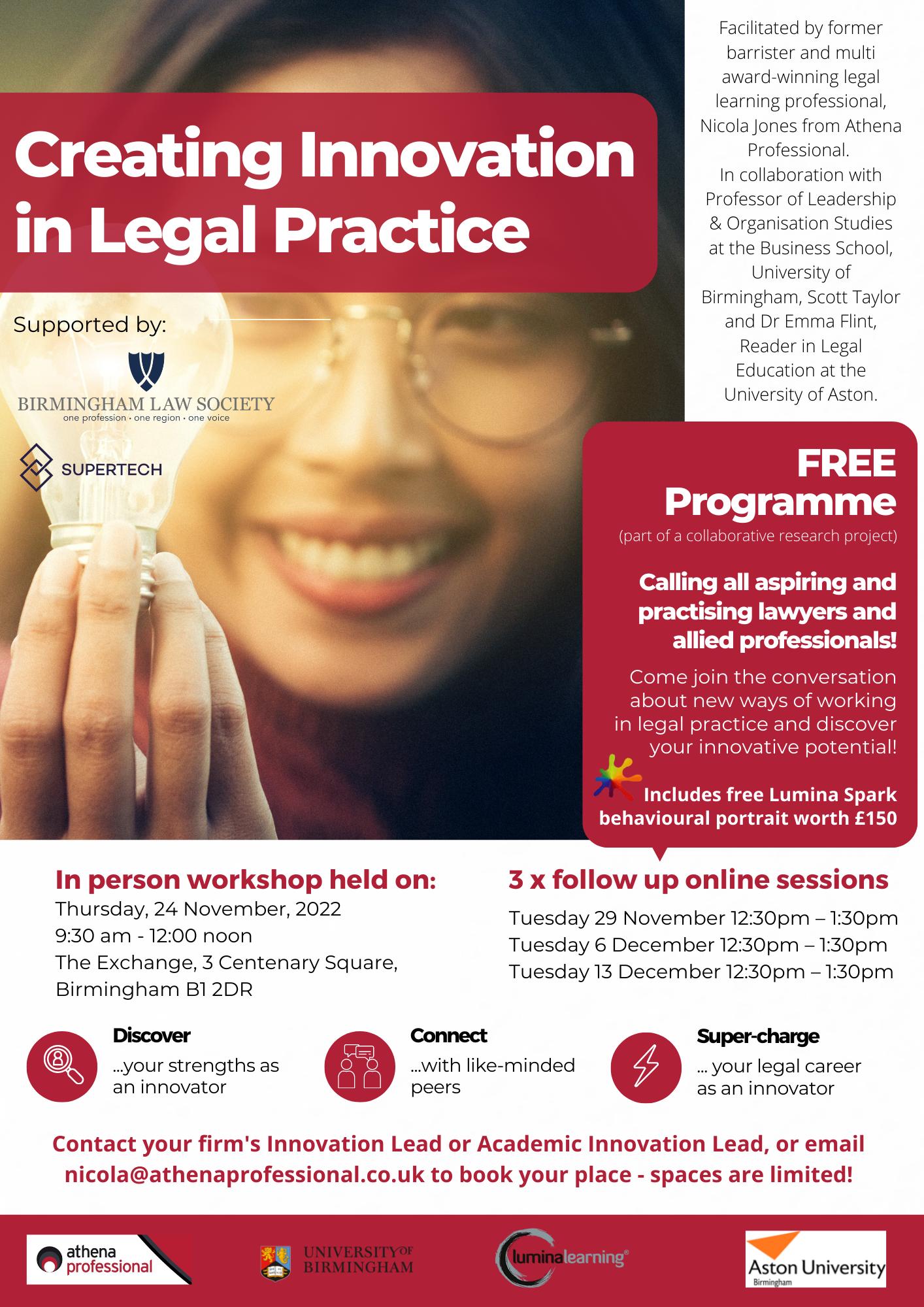
Jayne Willetts Solicitor Advocate and Bronwen Still Solicitor Consultant both of Jayne Willetts & Co Solicitors Limited share ten of the most significant compliance issues for the coming year. Firms need to be aware of all these hot topics to ensure that their policies, systems, and procedures will adequately deal with the current requirements and meet the planned changes.
1. ANTI-MONEY LAUNDERING COMPLIANCE
AML compliance remains the number one concern on the SRA’s radar with further extensive checks carried out this year on AML compliance by firms. The SRA’s annual report on this subject reveals that only 22% of firms were fully compliant. There were 51 “enforcement outcomes”, 8 referrals to the Solicitors Disciplinary Tribunal and 43 internal sanctions imposed by the SRA, the latter compared to
just 16 the previous year. It issued 29 fines, totalling £287,000, as well as letters of advice, rebukes, and warnings.
The main areas of non-compliance tend to remain the same. These include client and matter risk assessments not compliant or not done, a lack of adequate policies, the use of template policies and risk assessments which were not adjusted to the circumstances of the individual firm, poor due diligence on clients and a failure adequately to check the source of funds. With regard to risk assessments on case files, those that were non-compliant frequently failed to give any justification for the risk level assessed, failed to identify when enhanced due diligence was necessary and did not reflect the firm wide assessment.

These findings suggest that there is much work to be done by some firms for their COLP and MLCO. AML policies need to be checked to ensure they are up to date, the use of templates reviewed and audits conducted to ensure staff are following the correct procedures and fully understand them. The bottom line is that the SRA is under pressure from external bodies to take action so is likely to become even less tolerant to noncompliance in the future.
2. NEW SRA FINING REGIME
From 20 July 2022, the Ministry of Justice increased the SRA’s maximum fining power from £2000 to £25,000 for “traditional” law firms and those who work in them. In addition, once the Economic Crime and Transparency Bill becomes law, the SRA will have unlimited fining powers for any solicitors and firms caught up in economic crime.
Other changes are that the SRA will take into account the turnover of firms and financial means of individuals when setting fines. This could mean, for example, issuing a junior lawyer and senior partner - who have committed the same misconduct - with different fine levels to take account of their financial situations.

It is also introducing a schedule of ‘fixed penalties’ for lowerlevel breaches. These penalties would mostly deal with lesser or
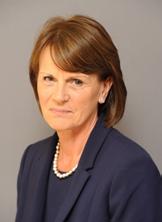
20 birminghamlawsociety.co.uk
REGULATION REPORT
COMPLIANCE TOP TEN TOPICS FOR 2023
administrative breaches – such as failures to comply with requests for information or requirements under the SRA Transparency Rules.
The inevitable consequence of the increased fining powers is that fewer cases will be referred to the independent and expert Solicitors Disciplinary Tribunal. The SRA will investigate, prosecute, and adjudicate upon its own cases. It has accepted that “higher fining powers bring with them the need for greater accountability” and that its adjudication function needs to be functionally separate and independent from the investigation process but how this is be implemented remains to be seen. With so much at stake, firms would be well advised to seek specialist advice if faced with an SRA investigation under these new powers.
3. SEXUAL MISCONDUCT, DISCRIMINATION & HARASSMENT
Alongside the increased fining powers, the SRA has decided that cases involving sexual misconduct, discrimination and harassment are to be singled out for special treatment. No longer is the seriousness of an allegation to be assessed on the evidence. An allegation involving these three areas of alleged misconduct will automatically be referred to the Solicitors Disciplinary Tribunal so that the SDT can consider imposing restrictions upon practice or suspension or strike off.
The SRA is amending its guidance to highlight that for these cases, financial penalties will only be considered in exceptional circumstances, with restrictions on practice, suspension or strike off the more appropriate sanction. The SRA is also consulting on piloting the use of victim impact statements for cases involving sexual misconduct, discrimination, or any form of harassment.
Why the SRA considers these cases to more serious per se than a case of a breach of client confidentiality or a conflict of interest may have its foundations in political and media considerations as opposed to any regulatory issues of fairness and proportionality. However, firms will be well advised to revisit all of their internal policies and procedures which could possibly touch upon
this type of behaviour – such as alcohol at work events; supervision; whistleblowing; billing targets and the like.
4. HEALTHY WORKPLACES
The SRA consulted on rule changes earlier this year to bolster its approach to ensuring firms adopt measures to ensure healthy workplaces. Although the proposed changes have not yet been put into effect, it appears that they will go ahead in the near future. The SRA’s underlying concern is the protection of the public who use legal services. Firms where staff are afraid to raise health or work issues and are bullied and treated badly are at risk of financial claims and reputational damage.
The changes proposed will introduce new standards into section 1 of both the Code of Conduct for Solicitors, RELs and RFLs and the Code for Firms. In essence, the new standards will require firms and individuals to treat colleagues and employees fairly and with respect and not to bully, harass or unfairly discriminate against them. Managers will be required to challenge behaviour that does not meet these standards.
The SRA has already issued guidance in February 2022 - herewhich sets out steps which it expects firms to take to create a culture which enables people within the firm to thrive and perform well. Key amongst these measure is proper supervision which includes monitoring concerns about health and competence. Staff should feel confident in raising these issues and that they are supported. The guidance will be updated when the new standards come into effect. In the meantime, firms could usefully review how they engage with their staff and the steps they could take to make improvements. Plenty of material is available to assist with this, including on LawCare’s website which you can read here
5. CONTINUING COMPETENCE
The Legal Services Board continues to develop its thinking on this topic and has been involved in evidence gathering, including how other jurisdictions ensure ongoing competence of lawyers. It produced a report in July 2022 and a “Statement of Policy – ongoing competence”, which sets out what
it expects of regulators.
Currently the SRA, in standards 3.2 and 3.3 of the Code of Conduct for Solicitors, RELs and RFLs, requires individuals to provide a competent service and to maintain their competence. Nothing otherwise published by the SRA explains what it expects to see by way of demonstrating competence. Following the LSB’s report it looks as though this may well be about to change.
In its policy statement, the LSB sets out outcomes it expects regulators to pursue. These are:
a. Set the standards of competence that authorised persons should meet at the point of authorisation and throughout their careers.
b. Regularly determine the levels of competence within the profession(s) they regulate and identify areas where competence may need to be improved.
c. Make appropriate interventions to ensure standards of competence are maintained across the profession(s) they regulate.
d. Take suitable remedial action when standards of competence are not met by individual authorised person.
To achieve these outcomes, the LSB expects that regulators will develop core competencies to cover such things as client care, practice management, ethics, specialist competencies some lawyers should have in, for example, advocacy and competencies required for different stages of an individual’s career. It also wants regulators to measure outcomes and to consider such options as reaccreditation at certain levels of an individual’s career.
How the SRA is going to achieve the LSB’s outcomes is no doubt currently being discussed. In the coming year and to ensure they are going in the right direction; firms should ensure that everyone has appropriate and up to date training in their areas of law and on key regulatory issues. For those with management and compliance responsibilities, the Law Society has, in 2022, introduced a new risk and compliance accreditation scheme which sits along the other accreditation schemes it runs, such as Lexcel.
@birminghamlawsociety 21
6. VULNERABLE CLIENTS
The Code of Conduct requires firms to “give clients information in a way they can understand” (Standard 8.6). The SRA has frequently emphasised the need for extra care to be taken in identifying and dealing with clients who are vulnerable.
The LSB has now conducted research which highlights the need for lawyers to provide better support for vulnerable clients. The LSB’s report, published in June 2022, makes some interesting points which firms could usefully reflect on. It looks first of all at what makes people “vulnerable” and points out that to an extent most members of the public when consulting a lawyer feel at a disadvantage simply because
there is a knowledge imbalance. This can be exacerbated by factors such as disabilities or poor health, poor mental health, experience of domestic abuse and low literacy. Others could include age, homelessness, and poverty. These disabilities tend to have an impact emotionally and financially and to produce a feeling of loss of control over their matter or problem.
The research highlighted behaviours which enable some firms to make a significant difference to reducing vulnerability. These could easily be adopted and to an extent are fundamental in creating a successful solicitor/client relationship. They include:
• Creating a welcoming environment (putting clients at ease at the outset).
• Managing clients’ expectations about roles, costs, timeframes, processes, and terms from the start and throughout their case.
• Listening to and understanding participants, their circumstances and their priorities with empathy and compassion, especially where experiences had been difficult or traumatic.
• Keeping clients informed in a timely manner, including with regard to costs.
Finally, the LSB published an infographic on the subject of vulnerable clients which could prove a very useful training tool for all fee earners dealing with members of the public whihc you can see here

22 birminghamlawsociety.co.uk
REGULATION REPORT
7. INCLUSION AND NEURODIVERSITY
The SRA published in October 2022 on its website various materials under the heading “Inclusive workplaces for neurodivergent lawyers”. The subject of neurodiversity is quite distinct and is not new. It has, however, only recently developed more exposure and is something many people will be unaware of. It forms part of the debate about equality and inclusion. To a certain extent it is an issue that sits alongside that of developing and maintaining healthy workplaces.
So, what is neurodiversity? ADHD, Autism, Dyspraxia, Dyslexia, Dyscalculia, Dysgraphia, and Tourette’s syndrome are all examples of neurodiverse conditions. People with these conditions have different ways of relating to people, thinking, processing information, and behaving. To give one example, people with autism may have difficulty with working in noisy environments, where there is no structure to their day and in some social situations. It is becoming clear that many lawyers with neurodiverse conditions are employed in firms and that there is a need to make adjustments so that they can thrive and contribute fully to the work of their firm. Firms that have a mentally healthy and supportive work environment will be well placed to do so.
There will doubtless be much more published on this subject in the next year and firms need to be aware that this is an issue they may need recognise and to make adjustments for.
8. TRANSPARENCY RULES
The LSB and SRA regard providing clearer information about lawyers, legal services and legal costs as being central to achieving the regulatory objective of improving access to justice. Between them, the Law Society and SRA provide publicly available information about the firms they regulate, the services they provide and the disciplinary record of individuals and firms. Under the Transparency Rules, firms are required to publish information about complaints handling, some regulatory information and, in relation to certain legal services,
comprehensive costs information. The purpose of publishing this information is to give clients the ability to compare the services and costs that firms offer and thus to encourage them to feel confident in approaching firms for assistance with their legal matters.
As most solicitors will be aware, the SRA takes very seriously compliance with the Transparency Rules and has done several checks on firms’ websites. Those not in compliance can expect to be sanctioned. It regards the rules as key to its drive to improve access to justice.
In July 2022, the SRA commissioned research through a company called Economic Insight into the extent to which firms and the public find the information that is published under the rules helpful. No doubt, the outcome of that research will be available in the near future and is likely to provide the basis for the rules to be updated and extended.
In the meantime, firms should check that they do meet the requirements of the rules, particularly with regard to the detailed information on costs and disbursements as this is where firms are often found to fall short. At the same time, it might be helpful to review whether the information is presented in a helpful and clear manner which is likely to attract prospective clients, rather than repel them.
9. LEGAL OMBUDSMAN CHANGES
Changes are being introduced by the Legal Ombudsman which will make it harder for clients to complain about the service delivered by solicitors. The changes are part of the Legal Ombudsman’s drive towards reducing delays in complaints handling and improved efficiencies. Delays of up to 18 months or 2 years had become commonplace.
From 1 April 2023, complainants will have one year from the date of the complained of activity to lodge a complaint. The current time limit is six years. Firms will need to communicate this information to clients in the coming months Other changes are the dismissal of a complaint if the detriment to the complainant is not significant and cases can be thrown out if too high or complex to be proportionality investigated. Finally, complainants
will not be able to add new issues to an ongoing investigation if they were already known to the complaint at the time the investigation started.
The changes are to be welcomed in order to streamline the Legal Ombudsman service for the benefit of clients and law firms alike.
10 ACCOUNTS RULES UPDATE
And finally, an update on the Accounts Rules.
The rule (Rule 3.3) against using client account as a banking facility continues to cause problems in practice for both clients and solicitors alike. Conveyancing, family, and commercial property are the areas of the law most affected.
The SRA will be publishing case studies in the New Year in order to provide further guidance for the profession. Particular problems are still being encountered by commercial property lawyers and their clients when trying to use SPVs (Special Purpose Vehicles) for substantial property developments and where the SPV does not have its own bank account. The SRA has suggested that third party managed accounts might be a solution.
In a recent SDT case (SRA v Khurram Mian SDT 12281-2021), the Tribunal found that, of thirty six inter-group company transactions, only two transactions were found to be in breach of Rule 3.3. The client was overseas and unable to access banking facilities. The two offending transactions were for salaries for golf club staff and a payment for a charity golf day. The SRA case studies on this awkward rule cannot come soon enough.
The SRA will also be consulting in the New Year on changes to Rule 2 (client money) and Rule 4 (client money must be kept separate). We await with eager anticipation as to whether there is further relaxation of the controls on client account. It will also consult on amendments to Rule 10 (operation of a client’s own account) in order to iron out practical difficulties in complying with this rule.
@birminghamlawsociety 23
USING
TECHNOLOGY
TO OPTIMISE COMMUNICATION IN PRIVATE CLIENT LAW PRACTICE
Ahead of his seminar on Private Client services at LegalEx later this month, Craig Matthews, Director of Lifetime Planning at LEAP Legal Software, explores how firms can utilise technology to instil effective communication methods within Private Client law practice.
In a fast-evolving world where advances in technology, world events and developing societal perceptions are all contributing to change, thriving private client law practitioners are realising the importance of using technology to update and optimise client communication methods.
Private client work poses the second highest risk of all legal services, as far as professional indemnity is concerned. Completing this work properly, conscientiously, and comprehensively, using effective, best practice communication methods, is vital. Practitioners are constantly looking at how best to communicate with clients directly and advise clients in terms of communicating with their families.
The risks are so great and the work so important that time is needed for private practice lawyers to consider each client estate and prioritise services to fulfil client’s needs properly.

The personal service provided is key and the documents produced are some of the most important documents your clients will ever own. It is their legacy, set out in words, printed, and signed under witness. The legislation around the advice given and the data captured is considerable.
Software can help with defining and communicating the best product offering and, at the same time, add efficiencies to processes to ensure this work remains profitable and is not a “loss leader”. It is important to mention that a technology optimised client communication strategy should always be focused on enhancing the value of the service provided. It should not be focused on keeping costs low to win business and then upsell additional services. The Law Society Wills and Inheritance Scheme specifically prohibits this practice. It does not need to replace traditional methods entirely but should optimise your ability to communicate with your clients in the most appropriate way for them.
Embracing the right technology can enhance communication and transform the productivity and efficiency of a department without detracting from the critical work performed by the solicitor. Clients of private practice lawyers require high levels of service and the guarantees associated with a reputable law firm.
One of the gaps that technology can fill is to assist with communication, both with testators drafting the documents and with the executors or beneficiaries dealing in the administration of an estate. A paperbased approach can be backed by a digital approach and vice versa, providing the client with the ability to choose which works best for them.
Providing client access to a client portal with the ability to review draft documents, to annotate, to ask
questions and to send messages is no different to the service that clients undergoing a conveyancing transaction have come to expect.
The client portal becomes a method for ongoing communication where clients can access their documents and review their wills at any time. A personal asset register provided when, for example, a will is drafted and updated from time to time can simplify estate discovery and help build client relationships.
An assumption that clients don’t want a digital first or digitally backed service should be re-evaluated. Increased adoption of technology amongst Gen X, those born between 1965 and 1980, continues to rise. Certainly, the following generations, millennials or Gen Y born between 1981 and 2000, will all expect to use technology to facilitate communication and data exchange. Their communication with their solicitors will not be an exception.
Private Client services is an often overlooked and undervalued area of practice and now is a good time to facilitate law firm growth, with communication playing a critical role. Implementing advanced technology will ensure firms maintain a flexible approach to embracing both traditional and digital methods of communication, and therefore position themselves to meet the needs of individual clients and estates for years to come.
For more information, please visit www.leap.co.uk.
birminghamlawsociety.co.uk
24 OPINION
How has the networking landscape transformed Post-Covid asks Ruth Kupshik from Robert Walters.
A conversation with Tony McDaid, the President of the Birmingham Law Society and CEO and Director of Clerking at No5 Barristers’ Chambers, has provided insight into the ways in which a return to the office is welcomed and encouraged at both a junior and senior level
If Tony had told me this time two years ago, that last week, he had 200 clients visit his Chambers to watch the World Cup, you would have West Midlands Police knocking on the door with no business cards and a £10,000 fine. Robert Walters and the Birmingham Law Society share a mutual understanding that face-to-face networking post-Covid has been a breath of fresh air ever-since restrictions have been lifted in the United Kingdom. It is important that people feel both comfortable and confident when navigating the in-person networking sphere, and Tony kindly provided his take on how to build effective business relationships in this once chartered, and now unchartered, territory.
UNTAPPED AND UNEXPECTED PERSPECTIVES
It is a truism that participation numbers at in-person networking events are lower post-Covid, especially at a senior level, due to flexible working arrangements such as ‘Working From Home’ (WFH). Tony understood that now you have ‘to give people a good reason to go [to the event]’. He says ‘whether it is educational or social, you need to draw people back into the office, or the city centre, and not bring them something dull, or something that they can’t see the benefit of.’ It is easy to understand that you are far less likely to be incentivised to attend an inperson event if you have just popped
the kettle on in the warmth of your own home.
To this end, why now, is it more important than ever, to finish that cup of tea and return to Birmingham to speak to other legal professionals? From our specialist recruitment perspective, in-person networking events are mutually beneficial for both senior and junior legal professionals; it provides access to perspectives that both groups would not usually come across on a daily basis. Junior legal professionals are able to provide senior legal professionals with a snap-shot of what the current market looks like to them, and are able to gauge an understanding of junior aspirations and ‘get a feel for what drives them at that stage’ (McDaid). In turn, juniors are gifted the opportunity to speak freely about their progression in a highly competitive market, and receive personable guidance in an open, unforced and unstructured conversation.
Tony mentioned that just recently, BLS hosted the highly successful ‘Alternative Dinner’, where a number of senior legal officials attended in order to give juniors a chance to speak to them about their expertise and experience. From a specialist recruitment perspective, this is highly critical in today’s market. Increasingly, junior professionals are now more than ever prioritising a strong and immersive company culture where they are provided 1:1 training with the seniors that they aspire to be like. Informal conversation that answers questions on a company’s culture are mutually beneficial; a junior professional can decide whether or not they can see a future in a particular firm, and in openly answering their questions, a senior professional allows the company to appear more personable and approachable to a potential employee. On top of this, it is
also important to note that young legal professionals (especially in the city) may not have the perfect setting conditions at home to produce high quality work peacefully without distraction, so it is ever important to confirm that they are in an office environment where they are supported by their seniors to fulfil their potential. Tony agreed, saying that ‘a lot of seniors understand the importance of guided interactions with junior professionals, so they are starting to come in to ensure [juniors] are the best they can be… it is a mind-set’.
CURATE YOUR PERSONAL BRAND

Shifting towards the benefits of networking at a senior level, Tony’s rich experience guided the conversation to an important aspect about networking in-person; the power of building your personal brand. At Robert Walters, we stress the importance of building your personal brand through not only connecting with like-minded individuals, but also representing the high-quality service you provide, and how it can help others maximise the efficiency of their recruitment processes. An example on our end was the joint event we shared with BLS; a ‘speed-quizzing’ Halloween event held for Birmingham’s Legal 500 and Top UK-100 firms, where we invited conversation about the recruitment market, whilst also catching up with some of our professional clients to maintain our long-term relationships with them. Despite the terrible weather, the event was a success; and points to my title for this piece which is Tony’s fantastic quotation ‘You can’t do business development from your frontroom’. We agreed that networking in-person allows potential connections to objectively see your active interest in them. Open conversation in a casual setting allows professionals to recognise opportunity, and act on it, in a naturally spontaneous manner.
Stepping back into a world where face-to-face interaction is encouraged, rather than criticised, can be nerve-wracking. However, both Tony and I concluded that there is a ‘genuine thirst at the moment to meet in-person’ (McDaid). There is excitement across the board to reestablish those intricate interpersonal day-to-day interactions. Whether you are in the office or at the football, these interactions provide the cement for sustained long-term business relationships. You can’t do business development from your front-room.
For more information about legal networking events in the Birmingham market please reach out to Ruth at Robert Walters – ruth.kupshik@ robertwalters.com or 07385 468 835.
NEWS
YOU CAN’T DO BUSINESS DEVELOPMENT FROM YOUR FRONT-ROOM...
TAKING THE STING OUT OF SELLING
Many of us hate the idea of sales. Clients tell me that networking and sales, though necessary for the organisation is toe curlingly painful writes Rebecca Mander of GuruYou.


I was in my earlier career a reluctant Sales Manager who then got asked to be Sales Director. As a coach these days I can safely say it is easier to sell products than ourselves. When we sell a service we are offering it feels personal when that sale is rejected.
Back in the good old days when I was traversing the nation with my samples bag full of doorbells up to the point I became Director of Sales, I was people pleaser and that makes sales even more challenging. The discomfort was immense but I was told I was good at it so I gritted my teeth and here are my 5 top learns from that time and since...
Sales Lesson 1. DON’T SELL!
I have found the best sales come when you are not selling. Networking and building relationships is far more fruitful.
When you have a natural conversation, people are drawn
to your passion for your work and what you do. Even when the focus is not on you, you have the chance to share by the questions you ask… which takes me to lesson 2…
Sales Lesson 2. DON’T JUST SAY SOMETHING, SIT THERE!
Do not panic about what you should say. Think about it for a minute…When you are networking do you prefer someone who is asking you about your business or someone who is talking non-stop about themselves? Your listening skills will be your biggest asset in sales. Take an interest and make someone feel good by doing so.
Sales Lesson 3.
KNOW YOUR VALUE.
Remember what you have to offer is as valuable as the time being given to you. Quite often we see the client as the parent whilst we are the child, grateful for any attention. Stay in the adult space, focus on the facts and remember your service and your time is of equal value. Do not thank people for their time, or tell them you are “just” following up your enquiry. You are in business and it makes business sense for both parties to collaborate.
Sales Lesson 4. LINK IN WITH YOUR NETWORK.
Use Linkedin! It is FREE and so so invaluable. Look up Helen Pritchard’s Free 5 day Linkedin challenge for tips…I did this and loved it!
https://getleadsfromlinkedin. com/5daychallengereg/

Today I have secured an incredible piece of work from someone I only know from Linkedin, and we have never met. Take it from me, it works and if you need more top tips, you know where I am!
Sales Lesson 5 SUCK IT UP.
Remember that someone may be a less efficient lawyer or from a less competent law firm, but their ability to build relationships can mean you are out competed. If you are not out there, someone else will be. There is no point in focusing on figures and forecasting if the ground work is not being done as this pyramid from Stephen Radcliffe illustrates!

For more information on these and other sales tips and techniques in the legal sector, come and find me on… you guessed it!
Linkedin
26 birminghamlawsociety.co.uk OPINION
The BPP Legal Apprentice Law Society



Although it can be argued that Legal Apprentices may gain more experience than those who take the "traditional" route, they often miss out on some of the key university experiences, i.e. meeting new people. This society aims to connect Legal Apprentices of all levels and help them build new relationships to further enhance their apprenticeship experience The Society is open to all Legal Apprentices
SAVE THE DATE!
In association with the Birmingham Law Society and No.5 Chambers, we are looking to hold a networking event on Tuesday 7 February 2023 at No.5 Chambers during National Apprenticeship Week 2023. More details to follow.
A m y M a r r e n : P r e s i d e n t a n d F o u n d e r I a m a f i f t h y e a r S o l i c i t o r A p p r e n t i c e w o r k i n g i n h o u s e a t B P P . I a m a l s o a d o u b l e P a r a l y m p i a n a n d I l e f t m y s p o r t i n g c a r e e r b e h i n d t o m o v e o n t o b e c o m i n g a s o l i c i t o r . T h e S o c i e t y w a s c r e a t e d t o p r o v i d e l e g a l a p p r e n t i c e s w i t h a s a f e s p a c e t o n e t w o r k w i t h t h o s e w h o s h a r e s i m i l a r e x p e r i e n c e s , w h i l s t a l s o i n c o r p o r a t i n g a m o r e t y p i c a l " U n i v e r s i t y f e e l " t o t h e i r p r o g r a m m e . I a m v e r y k e e n f o r t h e S o c i e t y t o r e f l e c t u s a s a g r o u p b u t t o a l s o a c t a s a p l a t f o r m f o r u s t o s h a r e o u t i n t e r e s t s a n d p a s s i o n s a s i n d i v i d u a l s
S a m a n t h a R o s s : B i r m i n g h a m C e n t r e C a p t a i n e p r e v i o u s l y c o m p l e t e d t h e L e v e l 3 C I L E x P a r a l e g a l A p p r e n t i c e s h i p a n d I a m e n t l y i n m y f o u r t h y e a r o f t h e S o l i c i t o r A p p r e n t i c e s h i p . I h a v e b e e n a t B e v a n a n L L P f o r 5 y e a r s i n t h e D e f e n d a n t C l i n i c a l N e g l i g e n c e D e p a r t m e n t I a m s o i t e d t o l e a d t h e B i r m i n g h a m C e n t r e a n d o v e r t h e n e x t f e w y e a r s , I h o p e t o s p r e a d a w a r e n e s s o f t h e S o c i e t y a n d c o n n e c t a l l t h e B i r m i n g h a m L e g a l e n t i c e s . I a m l o o k i n g f o r w a r d t o o r g a n i s i n g f u t u r e e v e n t s a n d m e e t i n g o t h e r A p p r e n t i c e s f r o m t h e B i r m i n g h a m a r e a
C o l e t t e N o o n e y : B i r m i n g h a m C e n t r e V i c e C a p t a i n
I a m a s e c o n d y e a r S o l i c i t o r A p p r e n t i c e a t W e i g h t m a n s L L P , c u r r e n t l y w o r k i n g i n t h e P o l i c e t e a m a f t e r d o i n g m y f i r s t s e a t i n E m p l o y m e n t I ’ m l o o k i n g f o r w a r d t o s e e i n g t h e s o c i e t y g r o w a s w e o r g a n i s e m o r e e v e n t s w i t h t h e a i m o f f o r m i n g a s t r o n g p r o f e s s i o n a l n e t w o r k o f l e g a l a p p r e n t i c e s L e g a l a p p r e n t i c e s h i p s h a v e p r o v e n t o b e a g r e a t s u c c e s s i n i m p r o v i n g a c c e s s i n t o t h e s e c t o r ; I h o p e t o u s e t h i s p l a t f o r m t o f u r t h e r p r o m o t e b o t h a p p r e n t i c e s h i p s a n d s o c i a l m o b i l i t y i n t h e l e g a l p r o f e s s i o n .
HOW TO JOIN
Head over to the BPP Legal Apprentice Society website and register for free. We are keen for the Society to reflect us as apprentices, so please do feel free to contact us via email (bpplegalappssoc@gmail.com) or through Instagram (@bpplegalapprencites)
We regularly organise both formal and informal networking events and we are currently planning some exciting things for the 2022/23 Academic Year!

N e t w o r k i n g e v e n t o n T u e s d a y 7 F e b r u a r y 2 0 2 3 a t N o 5 C h a m b e r s
The BPP Legal Apprentice Law Society is a fun and safe place for Legal Apprentices of all levels to interact and share their experiences
CLIMATE CHANGE REPORTS: THE NEW FRONTIER OF REAL ESTATE DUE DILIGENCE
“
A clear, industry-endorsed framework will help the ecosystem avoid confusion and ensure that we understand each other – not to mention the data – unambiguously. After all, with multiple data sources, platforms, modelling approaches, definitions, and interpretations, opinions and resulting advice can be wildly different. One projection might be overly cautious, another, less so.
The end users in our industry deserve better; home movers cannot be expected to make responsible decisions around property and climate change with inconsistent data and advice that cannot be validated against agreed standards or which is presented as an absolute, without taking into account context and relative factors.”
Jonathan Shaw, Director of Operations, Harvey, Donaldson and Gibson
“
Climate change is happening, and new regulations are both necessary and inevitable. But for regulations to make any meaningful impact on our collective effort to halt the effects of climate change, a fair consensus is necessary.
From government to in-sector groups, we need to be better aligned with our definitions, our terminology, and our timeframes – and that can only happen if there’s a holistic view within the property sector on which climate reference models and reporting disclosures to use. If not, those targets will remain out of reach… and time is running out.”
Anthony Baker & Nell Agate Tsui, Satellite Vu
Earlier this year, Landmark Information Group joined the Pledge to Net Zero initiative and committed to meeting science-based targets that align with the Paris Agreement, aimed at accelerating a transition to a net-zero carbon economy. As the first property data business in the UK to join the initiative, we were driven not only by the existential imperative we must all surely feel to manage climate change, but also by our own deep understanding of the role that the property industry – as a whole ecosystem – can and must play.
No country, industry or person will be untouched by the effects of climate change. When we zone in on property, particularly through our own lens of sector data and insights, we can see how the role of climate change reporting is set to take on even greater importance in the years to come. It is clear that we have reached a critical point where, as an industry we must ask: are we measuring the right things, in the right way, at the right time?
As a provider and partner to all parts of the property industry, Landmark has always sought to unify and connect data and participants. When it comes to climate change reporting, the new frontier of real estate due diligence, we are even more motivated to bring together the parties that can and will make a difference.
Our white paper, Climate Change Reports: The New Frontier of Real Estate Due Diligence, marks the start of that. We are immensely grateful to the pan-industry expert contributors who have lent their wisdom, insights and candid perspectives on this topic, and are heartened to
note that even in a complex and fragmented industry such as property risk and property data, there is a common understanding of the challenges and of the task ahead – and a shared energy with which we should best approach it.
The intersect between these future climate risks and the built environment has been the focus of this white paper, highlighting the new frontier of real estate due diligence which all property professionals must now navigate.
Reflecting on the conversations which have led to this publication, and on the collective contributions to it, what resounds is a unified desire, belief, and mandate for an approach to climate change risk management that truly connects the industry.

As The Lettings Industry Council’s Theresa Wallace concluded, “we are all in this together.” This adage is true at every level – from that of our collective humanity, to that of our roles as property professionals.
Climate change is a reality that demands a series of immediate and concerted responses. If you have been considering where your own organisation might start to respond to both the wider threat of climate change, and to the inherent risks faced by our businesses and clients, this is an incredibly good place to start.
You can access our white paper, Climate Change Reports: The New Frontier of Real Estate Due Diligence here
28 birminghamlawsociety.co.uk
OPINION SPECIAL FEATURE
1 in 6
properties in the UK are affected by flooding

0844 844 9966 | helpdesk@landmark.co.uk | landmark.co.uk/legal-conveyancing
How to buy legal practice management software
SIX THINGS TO CONSIDER WHEN BUYING LEGAL SOFTWARE
As a leading supplier of legal accounts and practice management software in the UK, Quill’s Executive Chairman
Julian Bryan advises on the primary considerations during the software procurement process. Julian’s knowledgeable insights ensure a smooth transition, a good fit for your firm and long-term success. Read on to discover how following these six steps can help your software purchasing to deliver efficiencies, growth and compliance at your legal practice.
Your software significantly affects your short- and long-term performance and profitability. It’s the difference between success and failure. With so much hinging on it, we recommend you focus on these six primary considerations during the buying process:
1. Accessibility
Post-Covid hybrid working is standard. Your staff should have the ability to access your systems from anywhere, at any time, on any device. The opportunity to perform case actions and log chargeable time must be ever present.
Software that can facilitate this by sitting in the cloud and being accessible through internet log-in is therefore a must. The addition of a smartphone app is a nice touch as it further simplifies the use of multiple devices.
2. Security
The cloud has its sceptics, primarily for reasons relating to security. You possess sensitive data, confidential documents and valuable client monies. These must be safeguarded always.
Check out your preferred supplier’s security credentials and your favoured software’s security controls – ISO certifications, Cyber Essentials accreditation, encryption protocols, user permissions, server and backup measures, BCDR plans, password protection with multi-factor authentication among them.
3. Cost and scalability
Learn
Consider what you need from your software on day one and what you might need in the future. You only want to pay for what you use. There’s nothing worse than paying for an over-engineered system with functionality that you hardly touch.
Look out for a system that can grow with your own firm’s expansion into new areas of law. Being able to switch on and only pay for new modules as you need them is key.
4. Exit plan and exportability
Having an exit strategy is a prerequisite to signing and sealing your contract. Not only do you need to ascertain the
minimum contract term and notice period, but you need to ensure you can easily get your data back in a suitable format and your old supplier subsequently permanently deletes that data.

In GDPR terms, your software provider is your ‘data processor’ but you remain the ‘data controller’. This means that you have significant responsibilities for the ongoing control of your data – your financial records, your client details, correspondence and associated documents. Make sure you understand the exit process and any reasonable service costs for obtaining your data on exit.
5. Integration and modularity
As your base layer, choose software that natively contains practice management and legal accounting tools. These are the bedrocks upon which your business is built. You could get terribly confused if you have client and office transactions in separate systems, leading to a real chance of financial error and possible breach.
From this substratum, add any modular boosts or third-party specialist systems for particular functions as needed. Tight API integration with these modules saves time, prevents duplication and maintains data integrity.
6. Supplier culture
Not strictly software related, but no less important, are the culture, ethics and heritage of the company supplying the software. Is there a good match with your own? With commonalities, there’s a greater chance of forging long-lasting relationships, human being to human being, with integrity and honesty at the core.
You never know at the outset just how much you’ll be in contact with your supplier once implementation is complete. When these contact points happen, you want a pleasant experience with a mutually satisfactory resolution to any issues raised. Make sure you can talk to a person when you need to. It makes sense to meet the key staff and make it your mission to get to know them before you commit.
Further reading
Quill’s ‘Six things to consider when buying legal software’ article was featured in the ‘Law Society Gazette’ earlier in 2022. Further software buying tips are available in Quill’s ‘Legal Practice Management Software Buyer’s Guide’ giving you the tools to navigate the minefield of choosing the right provider and best software for your business. Download at www.quill.co.uk/resources/legal-practicemanagement-software-buyers-guide.
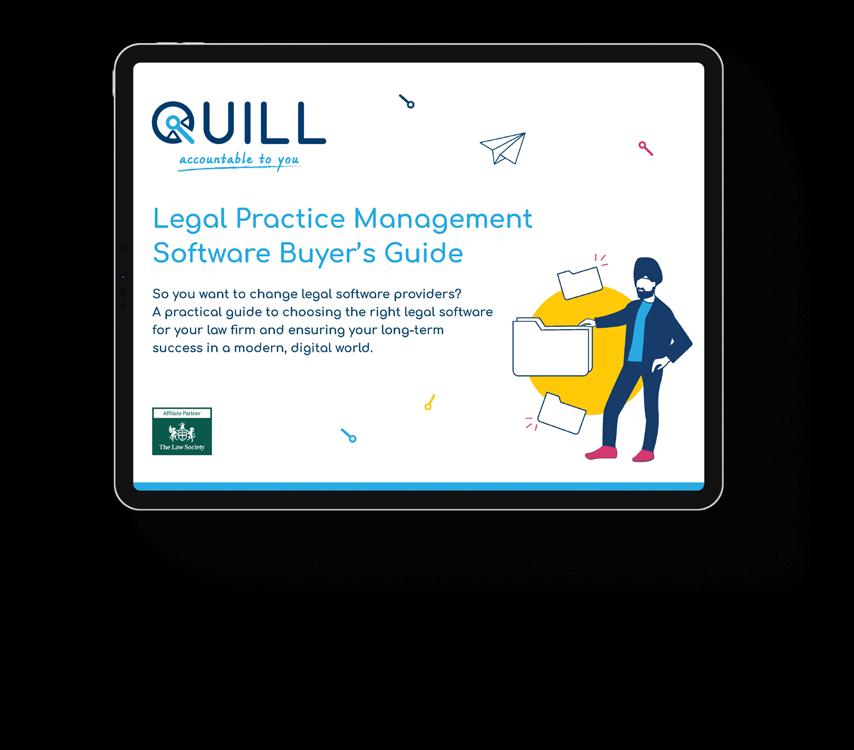
30 birminghamlawsociety.co.uk
OPINION SPECIAL FEATURE
guide to navigating the minefield of switching software suppliers
more: www.quill.co.uk/ resources/legal-practicemanagement-software-buyers-guide/
We work harder You work smarter
Our new and improved practice management platform makes managing all your law firm’s front-and back-end tasks easier than ever before. Work smarter.
Email sales@quill.co.uk to schedule a free demo today.
Quill, our software works harder,
that you can work
At
so
smarter.


























 Tony McDaid President
Birmingham Law Society thanks our Gold Sponsors
Tony McDaid President
Birmingham Law Society thanks our Gold Sponsors
































































































